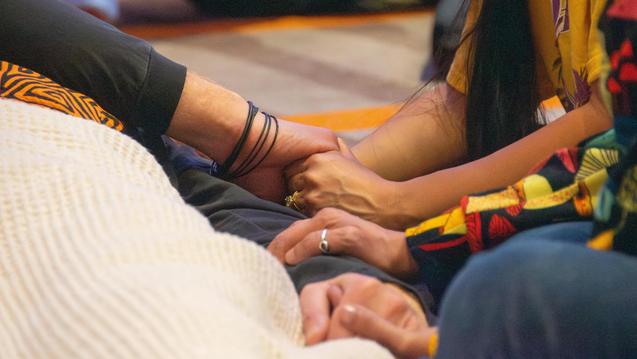
Applications Are Open
Seats are filling fast for the Psychedelic-Assisted Therapies and Research Certificate Program! Submit by the Priority Deadline: April 15, 2025
Frequently Asked Questions
Below you will find some of our most frequently asked questions about our psychedelic certificate program and the various benefits it confers.
About the Certificate
-
Founded in 2015, CIIS’ Center for Psychedelic Therapies and Research was the first-ever university-affiliated psychedelics certificate program, and after a decade, it is firmly established as the gold standard for professional training in psychedelics. Helmed by leading experts, grounded in rigorous study, and committed to safe and legal standards, this program offers cutting-edge education training in an environment focused on belonging.
-
Trainees learn a wide variety of skills, ranging from pharmacology of psychedelics to research design. Coursework also covers facilitation, counseling, and ethical competencies, psychedelic research protocols, and the history of use of psychoactive plants across the globe, emphasizing cultural competencies for working with diverse clients. The program thoroughly covers work with MDMA and psilocybin (the two medicines furthest along in the FDA drug development process), with additional coursework on ketamine-assisted psychotherapy (FDA-approved for specific clinical syndromes).
-
The Certificate in Psychedelic-Assisted Therapies and Research serves the growing need for the training of licensed therapists and researchers; ordained clergy and chaplains; as well as professionals with a MA/MS or a BA/BS degree in all areas of medicine and mental health, and from such fields as the social sciences, humanities, sciences, law, and business for future psychedelic-assisted psychotherapy research approved by the U.S. Food and Drug Administration (FDA), Health Canada, and European Medicines Agency (EMA). The Certificate can also help you enhance your own personal journey of transformation and well-being.
-
Cohorts – Whether in-person or online, our cohorts support in-depth learning and community. Cohorts build additional connections by establishing Home Groups, which are made up of 7-9 trainees who learn and work together for the entire certificate training. Trainees are also welcomed into affinity and special interest groups among their peers.
Innovative Learning Models – The learning environment is in the form of lectures, small group discussions, review of therapy sessions recordings, and experiential learning. Also utilized is the “flip class,” in which trainees pre-watch lectures and then use class time for discussion or instruction on deeper issues or finer points.
Culture of Belonging – The Center has partnered with CIIS’ Division of Diversity, Equity and Inclusion and is committed to working towards the co-creation of a culture of belonging throughout the program for all trainees to foster safety, empathy, connection, and risk-taking. Faculty, staff, trainees, and community members collaborate to increase learning about BIPOC, LGBTQIA+, Indigenous scholarship, worldviews, and cultures. Trainees learn to apply cultural competency and cultural humility in their own work.
Mentorship – Each trainee works with an expert mentor individually and in a group. The mentor assists them with professional development, assessments, and more. Our mentors are licensed clinicians and well-known researchers within psychedelic studies. Approximately one third of our mentors identify as BIPOC and/or LGBTQIA+.
Alumni Network – As the longest-running university-affiliated psychedelics certificate program, we have an extensive alumni network. Once accepted, you will be able to connect with professionals with a wide variety of specializations and interests and be part of a global community advancing the safe and ethical use of psychedelics for health and well-being.
-
Read what others are currently saying about the Center and hear from CIIS’ experts appearing in national media:
- Breathing Their Way to an Altered State
The New York Times, January 2024, featuring CIIS’s Center for Psychedelic Therapies and Research. - Can Psychedelic Therapy Help Veterans’ Mental Health?
Psychology Today, November 2023, featuring an article written by Mark Bates, graduate of the Center for Psychedelic Therapies and Research at CIIS. - A New Era of Psychedelics in Oregon
The New York Times, October 2023, featuring quotes from Janis Phelps, Director, Center for Psychedelic Therapies and Research. - As psychedelic-assisted therapy grows, so does interest from a new group: chaplains
NPR, September 2023, featuring Anthony Bossis, a current Center for Psychedelic Therapies and Research (CPTR) faculty member, and Jamie Clark-Soles, a graduate of CPTR. - What Does Good Psychedelic Therapy Look Like?
The New York Times, June 2023, featuring quotes from Janis Phelps, Director, Center for Psychedelic Therapies and Research. - Psychedelic medicine is coming—but who’s going to guide your trip?
National Geographic Magazine, May 2023, featuring CIIS’s Center for Psychedelic Therapies and Research. - CapRadio (NPR Sacramento) explores the benefits and risks of psychedelic treatment and how a proposed bill could reduce the stigma associated with mental health treatments.
CapRadio, January 2023, featuring Dr. Janis Phelps, Director, Center for Psychedelic Therapies and Research.
- Breathing Their Way to an Altered State
Application Details
-
- Applicants with advanced degrees (B.A. and above) which can lead to clinical licensure, ordainment, or commissions
- Applicants with an advanced degree or graduate level students in clinical or compatible fields such as:
- Social Sciences
- Allied Health
- Humanities
- Sciences
- Law
- Other affiliated disciplines, if space is available
- Applicants with a B.A./B.S. degree in the above fields
Some states limit eligibility; see our Eligibility Criteria for further details on state requirements and the full list of accepted degree types.
We encourage international applicants who were trained and/or reside outside the U.S. These international trainees have brought insightful breadth and depth into our classes and discussions.
-
We offer partial, need-based scholarships to trainees who demonstrate financial need through a letter submitted with the application. Need-based scholarships are allocated on a first-come, first-served basis for applicants in need who are offered enrollment.
-
This is a 10-month program that meets one weekend per month. For the hybrid cohorts, there are approximately 150 hours of instruction. The online cohort entails approximately 140 hours of instruction. All cohorts receive 30 hours of individualized learning and mentor consultation.
We estimate there will also be 120 hours of reading in preparation for the weekend courses, plus additional time for papers, and a final capstone project that will take approximately 20 hours. This breaks down to 6-8 hours of work per week for the duration of the program.
The program runs annually, with classes beginning in September.
-
We have hybrid programs in San Francisco and Boston, with on-site, in-person instruction, as well as online classes. We also offer a fully online cohort.
-
The Oregon subcohort is for those interested in becoming a legal psilocybin facilitator in the state of Oregon. Regardless of cohort, any applicant may participate in our training program in Portland, Oregon. Our certificate curriculum is approved as a psilocybin training program by the Oregon Health Authority (Training Program ID #TP-ce7dd84c) and authorized by the Oregon Higher Education Coordinating Commission (HECC). The Oregon statute 333-333-4050 has been expanded to allow people who are not residents of Oregon to be licensed as psilocybin facilitators. However, all Oregon licensed facilitators must conduct psilocybin work in approved OHA service centers in Oregon and nowhere else.
-
You can find the application portal here. If you have any questions or encounter any difficulties, please let us know at cptradmissions@ciis.edu.
Featured News
New York Times | June 2023
National Geographic | May 2023
CapRadio (NPR Sacramento) | January 2023





